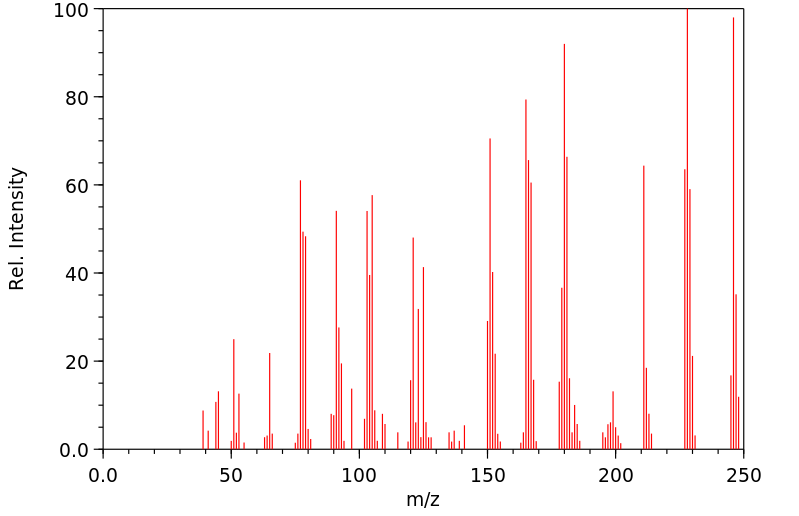2,4-dimethylphenyl phenyl sulfone | 4212-74-2
中文名称
——
中文别名
——
英文名称
2,4-dimethylphenyl phenyl sulfone
英文别名
2,4-dimethyl diphenyl sulfone;2,4-dimethyl-1-(phenylsulfonyl)benzene;Phenyl-(2,4-dimethyl-phenyl)-sulfon;2,4-Dimethyldiphenylsulfone;1-(benzenesulfonyl)-2,4-dimethylbenzene
CAS
4212-74-2
化学式
C14H14O2S
mdl
——
分子量
246.33
InChiKey
ZCVSDPUSEUOUHQ-UHFFFAOYSA-N
BEILSTEIN
——
EINECS
——
-
物化性质
-
计算性质
-
ADMET
-
安全信息
-
SDS
-
制备方法与用途
-
上下游信息
-
文献信息
-
表征谱图
-
同类化合物
-
相关功能分类
-
相关结构分类
计算性质
-
辛醇/水分配系数(LogP):3.4
-
重原子数:17
-
可旋转键数:2
-
环数:2.0
-
sp3杂化的碳原子比例:0.14
-
拓扑面积:42.5
-
氢给体数:0
-
氢受体数:2
安全信息
-
海关编码:2904100000
SDS
反应信息
-
作为反应物:参考文献:名称:Rearrangements of Aryl Sulfones. II. The Synthesis and Rearrangement of Several o-Methyldiaryl Sulfones to o-Benzylbenzenesulfinic Acids1摘要:DOI:10.1021/ja01511a054
-
作为产物:描述:2,4-二甲基苯硫酚 在 palladium on activated charcoal 氢气 、 双氧水 、 sodium methylate 、 亚硝酸异戊酯 作用下, 以 甲醇 、 二氯甲烷 为溶剂, 反应 5.0h, 生成 2,4-dimethylphenyl phenyl sulfone参考文献:名称:Novi, Marino; Garbarino, Giacomo; Petrillo, Giovanni, Journal of the Chemical Society. Perkin transactions II, 1987, p. 623 - 632摘要:DOI:
文献信息
-
[EN] QUINAZOLINE-7-ETHER COMPOUNDS AND METHODS OF USE<br/>[FR] COMPOSÉS DE QUINAZOLINE-7-ÉTHER ET MÉTHODES D'UTILISATION申请人:NEWGEN THERAPEUTICS INC公开号:WO2012158979A1公开(公告)日:2012-11-22The invention provides quinazoline-7-ether derivatives, particularly 4-anilinyl-6- butenamido-quinazoline-7-ether derivatives that are inhibitors of the receptor protein tyrosine kinases (RTK). The compounds are useful in the treatment of diseases and disorders where RTK activity is implicated such as a hyperproliferative diseases (e.g., cancer). Also provided are methods of preparation of the quinazoline derivatives and methods of use as therapeutic agents alone or in a drug combination.
-
An efficient method for aromatic Friedel–Crafts alkylation, acylation, benzoylation, and sulfonylation reactions作者:Ravi P Singh、Rajesh M Kamble、Kusum L Chandra、P Saravanan、Vinod K SinghDOI:10.1016/s0040-4020(00)01005-x日期:2001.1Aromatic electrophilic substitution reactions such as alkylation, acylation, benzoylation, and sulfonylation were studied in the presence of a catalytic amount of Cu(OTf)2 and Sn(OTf)2. Cu(OTf)2 was very efficient for alkylation, acylation, and benzoylation reactions. However, in case of sulfonylation reactions, Sn(OTf)2 gave better results.在催化量的Cu(OTf)2和Sn(OTf)2存在下,研究了烷基化,酰化,苯甲酰化和磺酰化等芳香亲电取代反应。Cu(OTf)2对于烷基化,酰化和苯甲酰化反应非常有效。然而,在磺酰化反应的情况下,Sn(OTf)2给出了更好的结果。
-
Metal-free sulfonylation of arenes with <i>N</i>-fluorobenzenesulfonimide <i>via</i> cleavage of S–N bonds: expeditious synthesis of diarylsulfones作者:Xiaohui Zhang、Yueji Feng、Yanyan Tuo、Qing-Zhong ZhengDOI:10.1039/d1ob02209a日期:——N-fluorobenzenesulfonimide (NFSI) toward the synthesis of diarylsulfones has been developed. The reaction represents a rare example of sulfonylation reaction using NFSI as an efficient sulfonyl donor and the first example of acid-mediated sulfonylation of unactivated arenes with NFSI via selective cleavage of S–N bonds. This protocol provides a concise approach for the construction of pharmaceutically
-
Acylation and Related Reactions under Microwaves. 4. Sulfonylation Reactions of Aromatics作者:Julien Marquié,、André Laporterie、Jacques Dubac、Nicolas Roques、Jean-Roger DesmursDOI:10.1021/jo0010173日期:2001.1.1reactive and/or nonvolatile reagents (anisole, xylenes, mesitylene) expeditious conditions (short reaction time at constant MW power without control of the temperature) were used. With less reactive and/or low-boiling reagents (benzene, toluene, halobenzenes), the rise in temperature and the increase of reaction time were controlled either by sequential MW irradiation or by a temperature order. It was shown
-
Sulfonylation of aromatic compounds with sulfonic acids using silica gel-supported AlCl<sub>3</sub>as a heterogeneous Lewis acid catalyst作者:Kaveh Parvanak BoroujeniDOI:10.1080/17415991003777391日期:2010.6Silica gel-supported aluminum chloride (SiO2–AlCl3) has been shown to be a mild, efficient, and chemoselective heterogeneous Lewis acid catalyst for direct conversion of arenes to sulfones using sulfonic acids as sulfonylating agents. The catalyst can be prepared easily with cheap starting materials and is stable (as a bench-top catalyst) and reusable.
表征谱图
-
氢谱1HNMR
-
质谱MS
-
碳谱13CNMR
-
红外IR
-
拉曼Raman
-
峰位数据
-
峰位匹配
-
表征信息
同类化合物
(βS)-β-氨基-4-(4-羟基苯氧基)-3,5-二碘苯甲丙醇
(S,S)-邻甲苯基-DIPAMP
(S)-(-)-7'-〔4(S)-(苄基)恶唑-2-基]-7-二(3,5-二-叔丁基苯基)膦基-2,2',3,3'-四氢-1,1-螺二氢茚
(S)-盐酸沙丁胺醇
(S)-3-(叔丁基)-4-(2,6-二甲氧基苯基)-2,3-二氢苯并[d][1,3]氧磷杂环戊二烯
(S)-2,2'-双[双(3,5-三氟甲基苯基)膦基]-4,4',6,6'-四甲氧基联苯
(S)-1-[3,5-双(三氟甲基)苯基]-3-[1-(二甲基氨基)-3-甲基丁烷-2-基]硫脲
(R)富马酸托特罗定
(R)-(-)-盐酸尼古地平
(R)-(-)-4,12-双(二苯基膦基)[2.2]对环芳烷(1,5环辛二烯)铑(I)四氟硼酸盐
(R)-(+)-7-双(3,5-二叔丁基苯基)膦基7''-[((6-甲基吡啶-2-基甲基)氨基]-2,2'',3,3''-四氢-1,1''-螺双茚满
(R)-(+)-7-双(3,5-二叔丁基苯基)膦基7''-[(4-叔丁基吡啶-2-基甲基)氨基]-2,2'',3,3''-四氢-1,1''-螺双茚满
(R)-(+)-7-双(3,5-二叔丁基苯基)膦基7''-[(3-甲基吡啶-2-基甲基)氨基]-2,2'',3,3''-四氢-1,1''-螺双茚满
(R)-(+)-4,7-双(3,5-二-叔丁基苯基)膦基-7“-[(吡啶-2-基甲基)氨基]-2,2”,3,3'-四氢1,1'-螺二茚满
(R)-3-(叔丁基)-4-(2,6-二苯氧基苯基)-2,3-二氢苯并[d][1,3]氧杂磷杂环戊烯
(R)-2-[((二苯基膦基)甲基]吡咯烷
(R)-1-[3,5-双(三氟甲基)苯基]-3-[1-(二甲基氨基)-3-甲基丁烷-2-基]硫脲
(N-(4-甲氧基苯基)-N-甲基-3-(1-哌啶基)丙-2-烯酰胺)
(5-溴-2-羟基苯基)-4-氯苯甲酮
(5-溴-2-氯苯基)(4-羟基苯基)甲酮
(5-氧代-3-苯基-2,5-二氢-1,2,3,4-oxatriazol-3-鎓)
(4S,5R)-4-甲基-5-苯基-1,2,3-氧代噻唑烷-2,2-二氧化物-3-羧酸叔丁酯
(4S,4''S)-2,2''-亚环戊基双[4,5-二氢-4-(苯甲基)恶唑]
(4-溴苯基)-[2-氟-4-[6-[甲基(丙-2-烯基)氨基]己氧基]苯基]甲酮
(4-丁氧基苯甲基)三苯基溴化磷
(3aR,8aR)-(-)-4,4,8,8-四(3,5-二甲基苯基)四氢-2,2-二甲基-6-苯基-1,3-二氧戊环[4,5-e]二恶唑磷
(3aR,6aS)-5-氧代六氢环戊基[c]吡咯-2(1H)-羧酸酯
(2Z)-3-[[(4-氯苯基)氨基]-2-氰基丙烯酸乙酯
(2S,3S,5S)-5-(叔丁氧基甲酰氨基)-2-(N-5-噻唑基-甲氧羰基)氨基-1,6-二苯基-3-羟基己烷
(2S,2''S,3S,3''S)-3,3''-二叔丁基-4,4''-双(2,6-二甲氧基苯基)-2,2'',3,3''-四氢-2,2''-联苯并[d][1,3]氧杂磷杂戊环
(2S)-(-)-2-{[[[[3,5-双(氟代甲基)苯基]氨基]硫代甲基]氨基}-N-(二苯基甲基)-N,3,3-三甲基丁酰胺
(2S)-2-[[[[[((1S,2S)-2-氨基环己基]氨基]硫代甲基]氨基]-N-(二苯甲基)-N,3,3-三甲基丁酰胺
(2S)-2-[[[[[[((1R,2R)-2-氨基环己基]氨基]硫代甲基]氨基]-N-(二苯甲基)-N,3,3-三甲基丁酰胺
(2-硝基苯基)磷酸三酰胺
(2,6-二氯苯基)乙酰氯
(2,3-二甲氧基-5-甲基苯基)硼酸
(1S,2S,3S,5S)-5-叠氮基-3-(苯基甲氧基)-2-[(苯基甲氧基)甲基]环戊醇
(1S,2S,3R,5R)-2-(苄氧基)甲基-6-氧杂双环[3.1.0]己-3-醇
(1-(4-氟苯基)环丙基)甲胺盐酸盐
(1-(3-溴苯基)环丁基)甲胺盐酸盐
(1-(2-氯苯基)环丁基)甲胺盐酸盐
(1-(2-氟苯基)环丙基)甲胺盐酸盐
(1-(2,6-二氟苯基)环丙基)甲胺盐酸盐
(-)-去甲基西布曲明
龙蒿油
龙胆酸钠
龙胆酸叔丁酯
龙胆酸
龙胆紫-d6
龙胆紫







